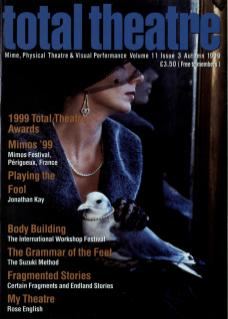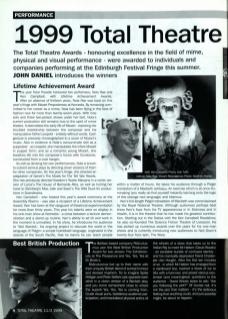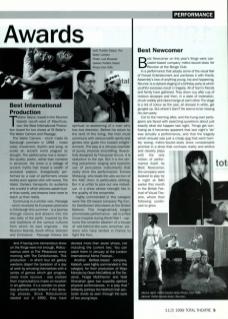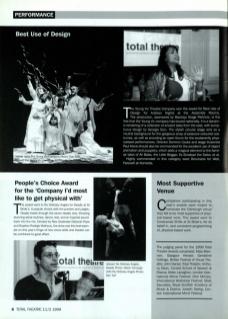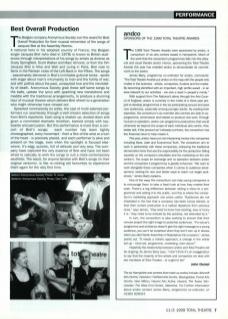Lifetime Achievement Award
This year Total Theatre honoured two performers, Nola Rae and Ken Campbell, with Lifetime Achievement Awards.
After an absence of thirteen years, Nola Rae was back on this year's Fringe with Mozart Preposteroso at Komedia. By remaining committed to her career as a mime, Nola has been flying in the face of fashion now for more than twenty-seven years. With nine solo and three two-person shows under her belt, Nola's current production still remains true to the spirit of mime theatre. It dramatises the early life of Mozart – exploring the troubled relationship between the composer and his manipulative father Leopold – entirely without words. Each gesture is precisely choreographed to a score of Mozart's music. Also in evidence is Nola's consummate skill as a puppeteer – as Leopold, she manipulates the infant Mozart in puppet form; and as a romantic young Mozart, she breathes life into the composer's future wife Constanze, constructed from a coat hanger.
As well as devising her own performances, Nola is known to subvert serious plays by directing clown versions of them for other companies. On this year's Fringe, she directed an adaptation of Genet's The Maids for The Tell Tale Hearts. She has previously directed Sweden's Teatre Manjana in a comic version of Lorca's The House of Bernarda Alba, as well as turning her hand to Strinberg's Miss Julie and Ibsen's The Wild Duck for productions in Scandinavia.
Ken Campbell – who hosted this year's award ceremony at the Assembly Rooms – was also a recipient of a Lifetime Achievement Award. Ken has been at the vanguard of theatrical experimentation for more than thirty years. This year his talents were on display in his one-man show at Komedia – a cross between a lecture demonstration and a stand-up routine. Ken's ability to ad lib and work in the moment is unrivalled. In his show, he introduces his audience to 'Wol Wantok', his ongoing project to educate the world in the language of Pidgin: a simple hybridised language, originated in the islands of the South Pacific, that he claims he can teach people within a matter of hours. He takes his audience through a Pidgin translation of a Macbeth soliloquy. An exercise which is at once illuminating (you really do find yourself instantly latching onto the logic of this strange new language) and hilarious.
Ken's full-length Pidgin translation of Macbeth was commissioned by the Royal National Theatre. Although audiences perhaps best know Ken's face from his TV appearances in In Sickness and in Health, it is in the theatre that he has made his greatest contribution. Starting out in the sixties with the Ken Campbell Roadshow, he also co-founded The Science Fiction Theatre of Liverpool. He has picked up numerous awards over the years for his one-man shows and is currently introducing new audiences to Neil Oram's twenty-four hour epic, The Warp.
Best British Production
The Belfast-based company Ridiculusmus won the Best British Production Award for two shows: The Exhibitionists at The Pleasance and Yes, Yes, Yes at St Bride's.
Ridiculusmus live up to their name with their uniquely British blend of surreal humour and devised mayhem. Try to imagine Spike Milligan and Peter Sellers cast opposite each other in a clown version of a Beckett play, and you come somewhere close to where the superb Yes, Yes, Yes is coming from. Crude visual puns, boisterous audience participation, and knockabout physical antics oil the wheels of a show that takes us to the Indian Raj to meet Mr Hatter (David Woods) – an excitable bundle of confused identity – and his manically depressed friend Chatterjee (Jon Hough). After the first ten minutes or so – in which Mr Hatter has emerged from a cardboard box, bashed a block of ice to bits with a hammer, and posed various existential (and meaningless) questions to the audience – David Woods stops to ask: ‘Are you following the plot?’ Of course not. It's not the plot that matters – it's the delicious feeling that anything could, and just possibly might, be about to happen.
And if having one tremendous show on the Fringe were not enough, Ridiculusmus were at The Pleasance every morning with The Exhibitionists. This production – in which four art gallery wardens dispel the boredom of a day at work by amusing themselves with a series of games which get progressively more raucous – was created from improvisations made on location in art galleries. It's a wonder no priceless artworks were broken in the devising process. Since Ridiculusmus started out in 1992, they have devised more than seven shows, not including the current two. You can catch them in January at the London International Mime Festival.
Another Belfast-based company, Kabosh, were highly commended in this category for their production of Mojo Mickybo by Owen McCafferty at The Traverse. Fergal McElherron and Niall Shanahan gave two superbly spirited physical performances, in a play that brilliantly portrays the Northern Irish sectarian divide as seen through the eyes of two young boys.
Best International Production
Théâtre Talipot, based in the Reunion Islands (south-west of Mauritius), won the Best International Production Award for two shows at St Bride's – The Water Carriers and Passage.
The Water Carriers – which made its Edinburgh premiere in 1998 – mixes voice, movement, rhythm and song, to evoke an ancient world plagued by drought. The performance has a dreamlike quality; poetic, rather than narrative in structure, the show is a collage of ancient myths that reveal a wealth of ancestral wisdom. Energetically performed by a cast of performers whose bodies soon appear slick with sweat, The Water Carriers transports its audience into a world in which pictures speak louder than words, and dreams have more to teach us than reality.
Continuing in a similar vein, Passage – which received its European premiere in Edinburgh this summer – is a journey through visions and dreams into the very belly of the earth. Inspired by the oral traditions of the various cultures from which its cast originate – the Reunion Islands, South Africa, Vietnam and Zimbabwe – Passage follows the spiritual reawakening of a man who has lost direction. Before his return to the land of the living, the man must commune with various earth spirits and genies who guide him toward enlightenment. The play is a virtuoso example of purely physical storytelling. Beautifully designed by Françoise Grund, it is seductive to the eye. But it is the stirring polyphonic singing and hypnotic use of percussive instruments that really drive the performance. Eunice Motaung, who leads the alto section of the ANC choir, is particularly striking. But it is unfair to pick out one individual, in a show whose strength lies in the quality of the ensemble.
Highly commended in this category were the US-based company Pig Iron, for Gentlemen Volunteers at the Gilded Balloon. This imaginatively staged promenade performance – set in a Red Cross hospital during World War I – captures the romantic idealism of a troupe of wet-behind-the-ears American soldiers who have landed in France to fight the Hun.
Best Newcomer
Best Newcomer on this year's Fringe were Lancaster-based company métro-boulot-dodo for Reunion at the Bongo Club. In a performance that adopts some of the visual flair of Forced Entertainment and combines it with Frantic Assembly's love of anything young, hip and happening, Reunion is a stylised staging of a birthday party at which youthful excesses result in tragedy. All of Sam's friends and family have gathered. They down cup after cup of noxious alcopops and then, in a state of inebriation, chuck wobbly pink blancmange at each other. The stage is a riot of colour as the cast, all dressed in white, get gunged-up. But where's Sam? He seems to be missing his own party.
Cut to the morning after, and the hung-over partygoers are faced with searching questions about just exactly what did happen last night. Things get confusing as it becomes apparent that last night's do was actually a performance, and that the tragedy which ensued was just a cheap gag that went horribly wrong. Métro-boulot-dodo show considerable promise in a show that confuses reality and artifice and cleverly plays with the very notion of performance itself. As Best Newcomer, the company were booked to play for a night at BAC earlier this month in the British Festival of Visual Theatre, where their following continued to grow.
Best Use of Design
The Young Vic Theatre Company won the award for Best Use of Design for Arabian Nights at the Assembly Rooms.
The production, sponsored by Barclays Stage Partners, is the first that the Young Vic company has toured nationally. It is a dynamic rendering of a collection of ancient tales from the east, with sumptuous design by Georgia Sion. The stylish circular stage acts as a neutral background for the gorgeous array of peacock-coloured costumes, as well as providing an open forum for the exuberantly physicalised performances. Director Dominic Cooke and stage illusionist Paul Kleve should also be commended for the excellent use of object animation and puppetry, which adds a magical element to the familiar tales of Ali Baba, the Little Beggar, Es-Sinsibad the Sailor, et al.
Highly commended in this category were Brouhaha for Well, Farewell at Komedia.
People's Choice Award for the ‘Company I'd most like to get physical with’
This award went to No Ordinary Angels for Deadly at St Bride's. A popular choice with the punters and judges, Deadly trawls through the seven deadly sins, throwing stunning aerial routines, dance, text, and an inspired sound track into the mix. Devised by New Zealander Deborah Pope and Brazilian Rodrigo Matheus, the show was the best example on this year's Fringe of how circus skills and theatre can be combined to good effect.
Most Supportive Venue
Companies participating in this year's awards were invited to nominate the Edinburgh venue they felt to be most supportive of physical-based work. This award went to Continental Shifts at St Bride's, for its belief in, and consistent programming of physical-based work.
Best Overall Production
The Belgian company Anonymous Society won the award for Best Overall Production for their musical reinvention of the songs of Jacques Brel at the Assembly Rooms. A national hero in his adopted country of France, the Belgian singer Jacques Brel (who died in 1978) is known to British audiences through interpretations of his songs by artists as diverse as Dusty Springfield, Scott Walker and Marc Almond, or from the film Jacques Brel is Alive and Well and Living in Paris. Brel rose to fame in the Parisian clubs of the Left Bank in the fifties. The songs – passionately delivered in Brel's inimitable guttural tones – spoke with anger about man's inhumanity to man and the futility of war; and with pathos about the past, unrequited love and the inevitability of death. Anonymous Society grab these self-same songs by the balls, update the lyrics with sparkling new translations, and meddle with the traditional arrangements, to produce a stunning hour of musical theatre which delivers Brel afresh to a generation who might otherwise have missed out.
Sprawled nonchalantly on sofas, the cast of multi-talented performers run seamlessly through a well-chosen selection of songs from Brel's repertoire. Each song is shaken-up, dusted down and given a committed dramatic rendition, backed simply with keyboards and percussion. But this performance is more than a concert of Brel's songs: each number has been tightly choreographed, every movement from a flick of the wrist or a turn of the head is precisely placed, and each performer is alive and present on the stage, even when the spotlight is focused elsewhere. It's edgy, quixotic, full of attitude and very sexy. The company have captured the very essence of Brel and have not been afraid to radically re-work the songs to suit a more contemporary aesthetic. The result, for anyone familiar with Brel's songs (in their original versions), is like re-visiting old favourites to experience them again for the very first time.
andco Sponsors of the 1999 Total Theatre Awards
The 1999 Total Theatre Awards were sponsored by andco, a consortium of six arts centres based in Hampshire. Much of the work that the consortium programmes falls into the physical and visual theatre sector. Hence, sponsoring the Total Theatre Awards this year has enabled andco to demonstrate its commitment to the sector.
James Barry, programme coordinator for andco, comments: ‘The Total Theatre Awards put andco on the map with the people who matter in the business – artists, companies, funders and the media. By becoming identified with an important, high profile award – in an area relevant to our activities – we sow a seed in people's minds.’
With support from The National Lottery through the Arts Council of England, andco is currently in the midst of a three-year project to develop programmes in the six participating venues and seek new audiences, especially among younger adults. By pooling their expertise, the consortium's six member arts centres are able to co-programme, commission and indeed co-produce new work. Through mutual co-operation, andco can programme productions that would otherwise be beyond the scope of each individual arts centre. And, better still, if the product isn't already out there, the consortium has the financial clout to help create it.
This year, andco have put commissioning money into companies including Kaos, Jade and Economical Truth. The consortium aim to work in partnership with these companies, redrawing the traditional demarcation lines that see the responsibility for the production falling squarely on the company's shoulders and the marketing on the arts centre's. The scope for exchange and cooperation between andco and the companies it programmes is greatly enhanced. ‘We want to work alongside these companies when it comes to audience development, looking for new and better ways to reach our target audiences,’ James Barry explains.
One of the ways the consortium can help young companies is to encourage them to take a fresh look at how they market their work. There's a big difference between selling a show to a programmer and selling it to the public, and this is where the consortium's marketing approach can prove useful. ‘Audiences are not interested in the fact that a company has been Lecoq trained, or that their current production is a radical departure from previous ones,’ says James, ‘they want to know how exciting, sexy or funny it is – they need to be enticed by the publicity, not alienated by it.’
In turn, the consortium is also working to ensure that their venues project the right image to potential audiences. ‘If a venue's programme and ambience doesn't give the right message to a young audience, you can't be surprised when they don't turn up in droves when you slip Frantic Assembly or Peepolykus into a season,’ James points out. ‘It needs a holistic approach, a change in the whole set-up – mind set, programme, marketing, even decor!’
Hopefully the relationship between andco and Total Theatre will be ongoing. As James Barry says, ‘I don't think it's an exaggeration to say that the majority of the artists and companies we deal with are members of Total Theatre – or ought to be!’
The judging panel for the 1999 Total Theatre Awards comprised: Mary Brennan, Glasgow Herald; Geraldine Collinge, British Festival of Visual Theatre; John Daniel, Total Theatre: Anthony Dean, Central School of Speech & Drama; Helen Lannaghan, London International Mime Festival; Dick McCaw, International Workshop Festival; Mark Saunders, Royal Scottish Academy of Music & Drama; Joseph Seelig, London International Mime Festival.
